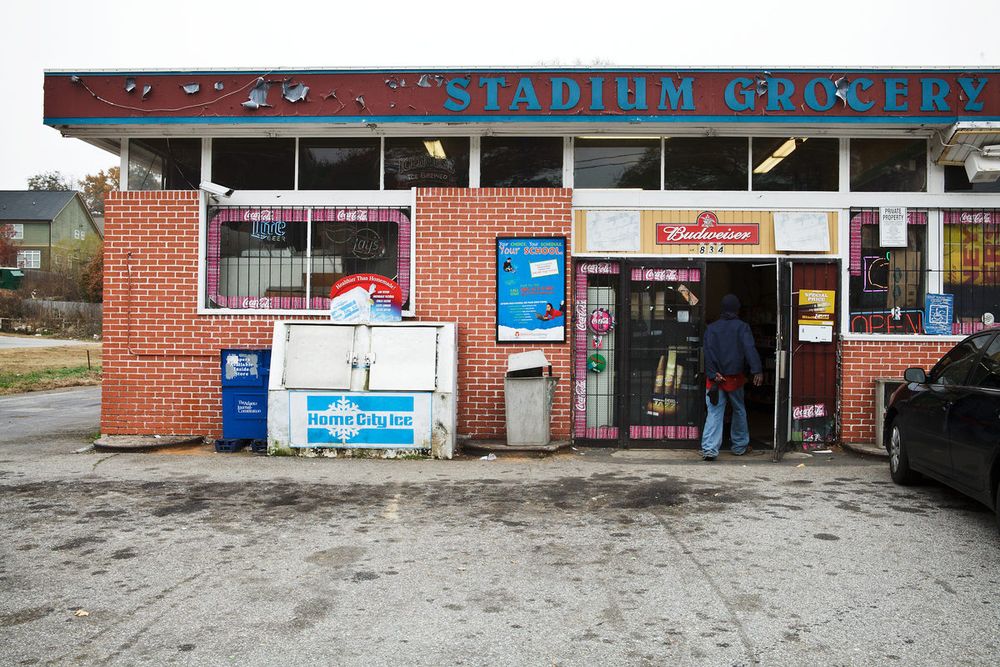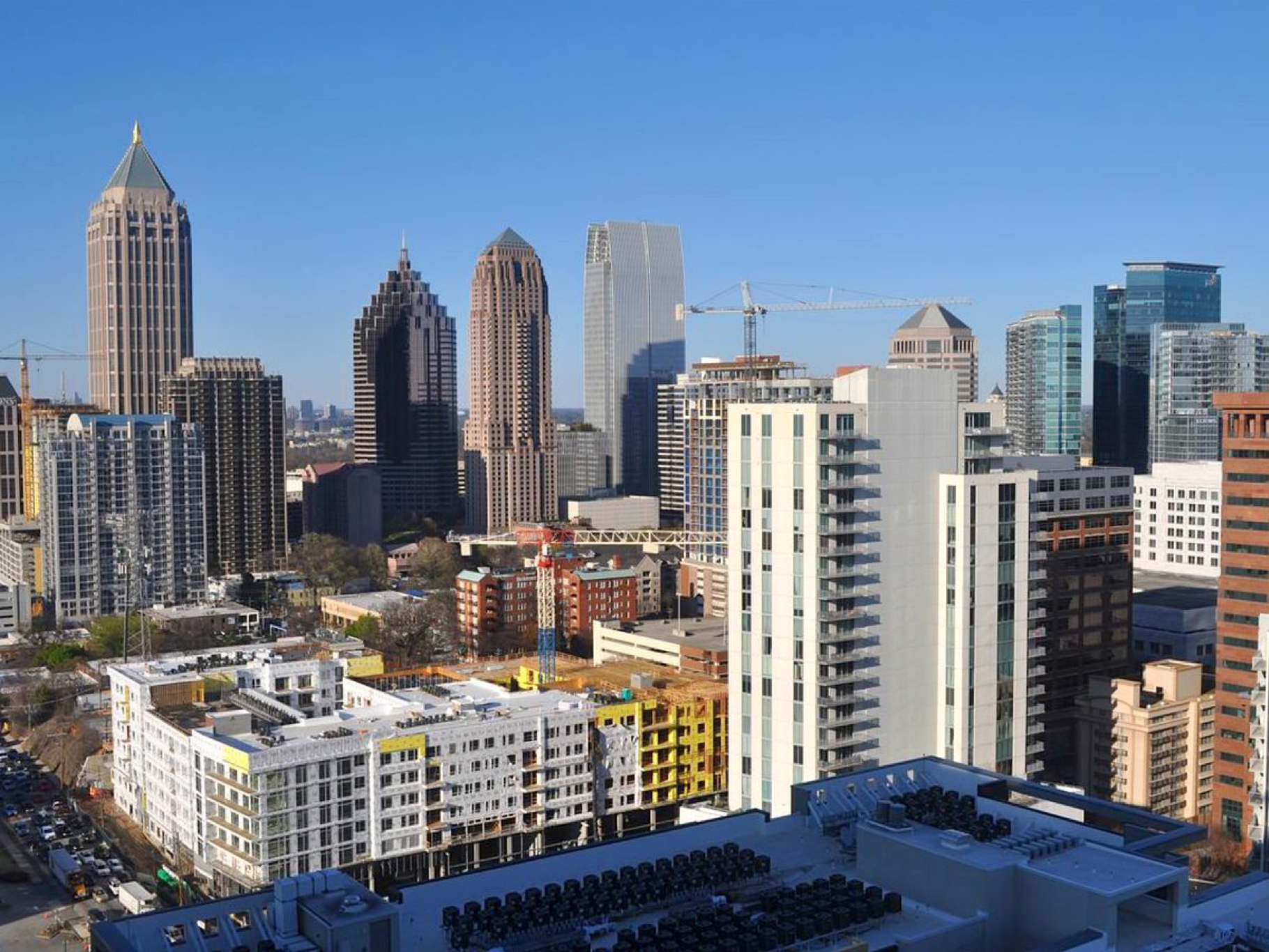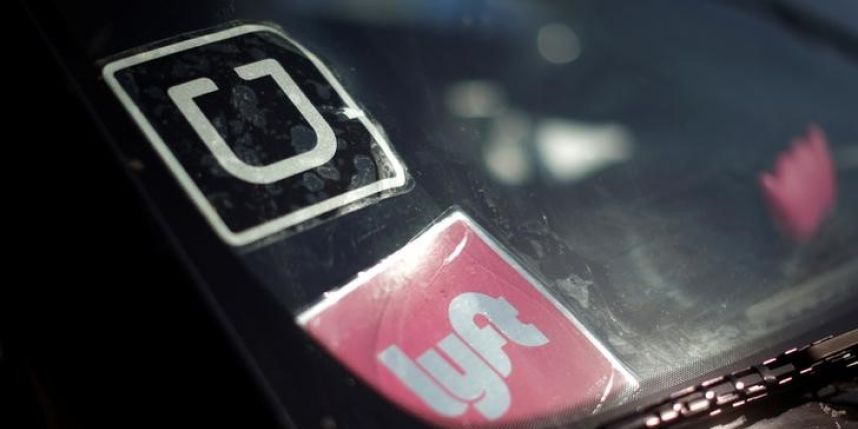By Alex Soderstrom
On a Sunday afternoon, as the Braves play in Philadelphia, Atlanta’s Peoplestown neighborhood seems abandoned. The streets are quiet, and the cracked sidewalks are empty. A quaint eatery with a sign reading “Stadium Grill” sits silent, its parking lot devoid of customers’ vehicles. A vacant Turner Field dominates the view to the north, its days numbered.
Soon, the Atlanta Braves will leave this neighborhood, along with the others the team has called home for 50 years. For the residents of these neighborhoods that will be left behind, the question is, “What next?”
The End of an Era
In November of 2013, the Braves announced they would be moving to the suburbs of Cobb County. Cementing plans to cease playing games at Turner Field, their home of 20 years, the Braves will be playing in a brand new stadium partially bankrolled by the Cobb local government. This announcement came on the heels of disagreements between the Major League Baseball organization and the City of Atlanta, which owns Turner Field, over the cost of renting the facility.
On the southern end of Atlanta, the reality facing local residents is a complicated one. The three communities that surround Turner Field – Summerhill, Mechanicsville, and Peoplestown – are at a crossroads in the wake of the Braves’ move. The stadium brought important income, but never really led to the explosive development once predicted. In spite of the short-run economic hit these communities will face when the Braves leave, the expansion of a local university to fill this space may provide the community an opportunity to become the lively hub it was never became as a backdrop to Turner Field.
To the east of Turner Field, the neighborhood of Summerhill is no more than a single square mile. Yet, this small community faces several toxic problems. City Data reports that crime rates are buoyed above the national average, while unemployment is nearly 13 percent, more than twice the national and state average of 5 percent. The median household income hovers just above $26,000, far short of the Census Bureau’s reported median income for Georgia of $49,300.
In Mechanicsville and Peoplestown, to the west and south of the stadium respectively, the situation is even more dire. Over a third of residents are reportedly unemployed, while the median income sags below $20,000 in Mechanicsville and $30,000 in Peoplestown. The neighborhoods display many of the classic plights of urban America, with little observable benefits of being next to the home of one of baseball’s most profitable franchises.
A closer look, however, reveals what the Braves and Turner Field offered these Atlanta districts and what will be lost come the end of the season. Incomes in the area have exploded since 2000, only three years after Turner Field opened, climbing by more than 30 percent in Summerhill and over 90 percent in Peoplestown and Mechanicsville. In comparison, the median household income in Georgia has only increased 18 percent in that same amount of time.
Although correlation does not amount to causation, to suggest the relative economic growth of the hamlets surrounding Turner Field can be attributed to the Braves is hardly a stretch. A 2013 study by Georgia State University determined the Braves provide a $100 million benefit to the Atlanta area between the taxes that go to local governments and fans’ dollars that go to local businesses.
While it is unknown exactly how much of that $100 million finds its way to Summerhill, Mechanicsville, or Peoplestown, the communities do see 8.25 percent of the annual parking revenue, a contingency of the original deal to construct what would become Turner Field. That small slice of revenue amounts to $8 million since 1997, a sum designated to the specific neighborhoods that play host to the ball club.
Along with this indirect revenue, jobs for local residents in the stadium itself are already disappearing. In November, the company that operates Turner Field’s concessions, Aramark, announced it was laying off more than 1,000 workers. The company also revealed its contract with the Braves, which stretched back to the 1960s, was over. When the Braves begin taking the field at SunTrust Park in 2017, a new company will oversee food services, and there are no guarantees current concession employees will retain their jobs. Even if they did, many current employees would likely be unable to find transportation to the new stadium.
As the Braves depart the heart of Atlanta, so depart the dollars that have been pumped into the surrounding neighborhoods for decades. Communities once offered a bright future in the mid-90s, when Atlanta was rapidly growing and playing host to the Olympic Games, are now seemingly left in the dust as money follows the team to the suburbs. It can be said that Turner Field represented the Atlanta of the 90s, an optimistic city on the rise. It can also be said that the decision to abandon the stadium and flee to the suburbs is a rejection of that vision and an indictment of the city’s current state.
A New Home
Instead, the team turns its attention to Cobb County, where few of the problems that persist downtown are relevant. In the Vinings area by the new stadium, home values are floating above $400,000 and median household income is an above-average $64,000. But, by most accounts, SunTrust Park will only make things better for the community.
The ballpark itself is projected to generate $6 million annually in local and state taxes, according to Atlanta real estate broker Cushman & Wakefield. Outside the stadium, fans will be able to explore a 2.4 million square foot complex known as Battery Atlanta, which will contain dining, shopping, an entertainment theatre, and an Omni Hotel. This massive commercial district is expected to create 5,200 new jobs for local residents and create untold revenue in the forms of sales tax. In addition, plans are in the works to create a bus system linking MARTA to the south and Kennesaw State University to the north, a possible solution to the parking and traffic issues that plagued Turner Field.
A decreased need for parking, coupled with the more developed infrastructure of Vinings compared to southern Atlanta, also makes the ambitious plans for Battery Atlanta feasible. For the residents of the communities that supported the franchise for decades, this could feel like a slap in a face. Summerhill, Mechanicsville, and Peoplestown will all be on the outside looking in as Cobb County and the Vinings area grow more prosperous from spending sparked by their former neighborhood team.
An Imperfect Relationship
In reality, however, the Braves’ absence will be less of an abandonment of central-southern Atlanta and more of an opportunity for the area to become the vibrant center that Midtown and Buckhead have been for years. As they stand, the neighborhoods surrounding Turner Field are devoid of significant development, serving primarily as the home of several apartment buildings and concrete lots. The restaurants and shops that were promised to flood the area upon the opening of Turner Field never materialized.
For example, a 1993 city development plan for Summerhill, proposed in light of Atlanta’s nomination as the host city for the 1996 Olympics and revisited in 2004, pictured multi-unit housing complexes with restaurants and stores on the ground level lining Georgia Avenue where it runs into Hank Aaron Blvd. Today, that space is occupied by an empty asphalt lot and a single abandoned home covered in graffiti.
Peoplestown and Mechanicsville were sold the same pitch when the then-new stadium was built in order to host the Olympics and supplant the old Atlanta-Fulton County Stadium, yet the development never came. Instead, fans drive in for the games and leave immediately afterward, finding no reason to stick around the stadium. A large portion of the $100 million Turner Field brings to the city ends up lining the pockets of the plentiful hotels and restaurants in Midtown and Buckhead.
Georgia State’s Move
While the Braves’ decision to move is an economic homerun for Cobb County, it may also serve as a new beginning for this section of Atlanta’s downtrodden neighborhoods. In August, Georgia State University (GSU) finalized a deal to purchase the stadium and the land surrounding it, some 60 acres in total, from the city for $30 million.
The rapidly expanding university, where enrollment has grown by more than 25 percent since 2000, intends to convert Turner Field into a football stadium for its relatively young program and build a baseball stadium next door on the former site of Atlanta-Fulton County Stadium. On surrounding parking lots, GSU plans to construct dorms, university facilities, and retail developments, making it a potentially rewarding deal for the residents of Summerhill, Mechanicsville, and Peoplestown. If GSU strikes this deal, jobs in the area will become abundant, and a wave of student residents will create a new market of customers. Housing and real estate values are expected to spike as businesses enter the community and as GSU looks to expand its holdings in the area.
At least one local resident sees this vision as a coming reality for the neighborhoods. Suzanne Mitchell, president of the Organized Neighbors of Summerhill, an association recognized by the City of Atlanta, believes the arrival of GSU will transform her community. “The development will come,” she said.
Preserving Communities
Her concern, the same concern of many living in the area, is not if development will come, but what will happen once it does. Summerhill is already experiencing the difficult process of opening up to a college atmosphere while maintaining its identity. At one area home, a GSU student is putting up Greek letters above the door, signifying a soon-to-arrive fraternity house.
In addition to possible alterations to the identities of these neighborhoods as residential areas, GSU’s presence in the three communities brings a greater threat: gentrification. As the university shakes up the whole area, home values will go up, but so will rents and the incentives for landlords to sell to developers. If growth is left unchecked, the residents of Summerhill, Peoplestown, and Mechanicsville may soon find themselves unable to afford to live in their own neighborhoods.
Local voices are already speaking out against such a scenario and looking to guarantee their homes are protected. On Sept. 7, members of the Turner Field Community Benefits Coalition, a group tasked with advocating for the interests of the Atlantans living in Turner Field’s shadow, gathered on Georgia State’s campus. Their mission: urge university president Mark Becker to sit down with the group and hear their concerns regarding displacement of current residents. Although Becker’s office has so far declined, saying such talks are too far removed from any real development, residents have made clear their expectation of inclusiveness in such discussions.
The GSU demonstration is likely only one battle in the war the Turner Field coalition is set to wage against gentrification. In February, the group added to its official platform a call for GSU to include a community benefits agreement as part of the expansion project. Included in the agreement is, among other things, a plan to “prevent community displacement.”
Though the fight against gentrification will go on as Georgia State moves into the area, many, including Mitchell, are confident their neighborhoods can modernize and develop without selling out its residents. To her, growth comes with a caveat.
“This is a community with families and seniors and kids,” she said. “We can add, but we’re not going to change.”
It is too early to say if Summerhill, along with Mechanicsville and Peoplestown, can achieve a balance of expansion while retaining their cultural identity. What is certain is that change, in some form or another, is coming. And one day, while the Braves are taking the field in suburbia, the neighborhoods the team once called home will no longer see the days of empty streets and quiet weekends but will be the robust, lively communities they have deserved to be for so long.


